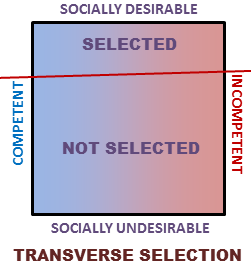Category Archives: Uncategorized
You may have heard, scientists recently determined that Scholz’s Star passed within a petameter of the Sun only 70 thousand years ago. That means it swept through our Oort Cloud. (For a good perspective on how far out the Oort Cloud is, click here.)
Well, if you’re thinking that those numbers really don’t help you understand how close that is in interstellar terms, here’s a graphic to help you make sense of it, with the distances to many of the nearest stars provided for perspective. Continue reading
 The consequences of transverse selection are now being exposed in the US military, with one Air Force colonel complaining that the Service’s physical fitness standards select against too many airmen who excel at their actual job requirements.
The consequences of transverse selection are now being exposed in the US military, with one Air Force colonel complaining that the Service’s physical fitness standards select against too many airmen who excel at their actual job requirements.
Of course, physical readiness is certainly important to military readiness, but it is no longer the cornerstone of most military occupations, particularly in the Navy and Air Force.
Like those archaic pike and musket formations that still guide our social construction of what military discipline is all about, the over-emphasis of physical over mental readiness is a lingering trope that desperately needs reform.
In the Information Age, “fit for service” means much more than body fat percentage and push-ups per minute, and clinging to out-dated social ideals of the perfect warrior drives a bad selection process that costs us good Service members, which costs lives, and could one day cost us a war.

 Tuesday’s child, alleges the poem, is “full of grace.”
Tuesday’s child, alleges the poem, is “full of grace.”
Tuesday’s readings on lit and entertainment certainly are!
Electric Lit is spreading the grace around, with Katya Ungerman‘s list of “The Best Graphic Novels I’ve Ever Read.”
Bill Morris at The Millions asks why we are “drawn to something in the character of people who are willing to break the law in order to perform a service they see as vital to mankind and the planet” and examines four works (novels and a film) about eco-terrorists.
But, maybe you’re looking for something a little more practical and prosaic. Well, if you need a way to check an EPUB file to make sure it will be accepted by different ebook stores, Dianna Dilworth at GalleyCat has a suggestion.
Finally, at Granta, Sophie Lewis interviews Israeli author and film-maker Etgar Karet, who reminds us that:
[U]sing the word ‘peace’ destroys the actual possibility of peace occurring. Instead we should stop using ‘peace’ and start using ‘compromise’ … in Israel the word ‘peace’ has a kind of Masonic aspect: you pray for peace. But if you use ‘compromise’ you cannot ignore that there is someone on the other side; you cannot ignore that you have to give up on something to achieve it. Peace could be a gift. It’s a word that doesn’t assume any responsibility. It’s not attached to you, nor to the other side. And ‘compromise’ is not utopian. In Israel many people say we’ll never have peace. Why? Because they’ll always hate us. But you can have a compromise with somebody who hates you. It’s OK! They don’t have to like you. You just have to agree that you’ll stop trying to kill each other and then you’re getting somewhere.
_
Style guide: Texts, performances, and periodicals (including websites) are italicized. Key persons are in bold.
 There are people who want to be successful, and there are people who want to succeed.
There are people who want to be successful, and there are people who want to succeed.
Being successful means success in social terms, in terms of status, respect, credential, and self-esteem.
To succeed means success in practical terms, in terms of measurable progress, achievement, evidence, and self-improvement.
People who want to be successful say, “Let’s make this work!” Let’s build a business process out of enthusiasm and a can-do attitude! Let’s build a profitable third quarter out of persistence and cookie-cutter talking points about diversity, team effort, and leadership! Let’s build a ship out of cotton candy and unicorn dreams!
People who want to succeed are not afraid to say, “That isn’t going to work!” Collecting metrics on important but infrequent events will not provide a statistically valid sample size. Training people to improve innate talents they lack will never result in excellent performance. Obsessing about physical diversity while mismanaging intellectual diversity will achieve neither justice nor effectiveness.
People who want to succeed are not afraid to point out bad plans, no matter how frustrated it makes people who want to be successful, because the real world has real consequences and real causality. You can’t cheer yourself to success.
In his blockbuster research work Good to Great, researcher Jim Collins revealed that facing the “brutal facts” is a key part of reversing decline and transforming a good organization into a great one.
Unfortunately, America no longer has a culture that easily absorbs brutal facts.

 Welsh names are underaprhysiated.
Welsh names are underaprhysiated.

 Sometimes, it is hard to believe that we actually have little robots rolling around the surface of another world, digging into the dirt and taking photos, a world that is still in the running for having life.
Sometimes, it is hard to believe that we actually have little robots rolling around the surface of another world, digging into the dirt and taking photos, a world that is still in the running for having life.
It’s the stuff of science fiction in the real world, and occasionally it’s nice to take a moment to appreciate how remarkable it is to have a presence on an alien world … and how eerily familiar the landscape of that other world can be.
When I decided to share these NASA photos, I was tempted to pass them off as shots of deserts on Earth (only going for a big Shyamalanian reveal at the end). But, no, these are photos of Mars … and you won’t believe how beautiful our little brother planet can be!

 It has never (yet!) been a serious possibility, but the proposal to rename Uranus does keep popping up. And not simply because it sounds perverse in English no matter how you stress it, but because it violates the theme of the planets in our star system having names of gods in Latin.
It has never (yet!) been a serious possibility, but the proposal to rename Uranus does keep popping up. And not simply because it sounds perverse in English no matter how you stress it, but because it violates the theme of the planets in our star system having names of gods in Latin.
“Uranus” was simply a Latin transliteration of a Greek god’s name. Moreover, the Greek Ouranos was god of the entire sky, so it’s a little weird to give a single planet this name.
Unfortunately, since Uranus was named (after a political fracas caused when William Herschel tried to name the planet he discovered after himself and then after the king of England) the other big Roman deities have mostly been scooped up. Ceres and Pluto are dwarf planets, for example. Vesta is an asteroid and Janus a satellite of Saturn.



